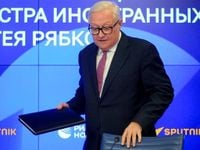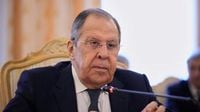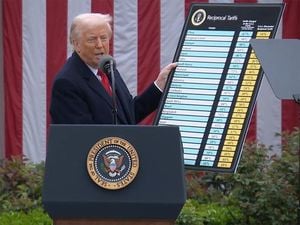In a significant diplomatic development, Russian Foreign Minister Sergey Lavrov announced on April 1, 2025, that Russia is preparing for a third meeting with the United States to address ongoing disputes related to the conflict in Ukraine. This announcement comes amid rising tensions and frustrations from both sides regarding the progress of negotiations.
During a press briefing, Lavrov expressed cautious optimism, stating, "I see emerging progress and a willingness from our American partners to remove unacceptable obstacles to the diplomatic work of our countries." This sentiment reflects a desire for constructive dialogue, although the situation remains precarious.
Lavrov emphasized that Russia requires concrete actions rather than mere promises, particularly regarding the attacks on its strategic aviation facilities in Ukraine. He reiterated Russia's commitment to a ceasefire and the need for compliance with protocols at nuclear facilities. "The Russian army is committed to observing fire protocols, which President Vladimir Putin ordered in connection with a phone call with US President Donald Trump on March 18," Lavrov stated.
In a parallel development, Russian Deputy Foreign Minister Sergei Ryabkov rejected current American proposals for a ceasefire in Ukraine. He indicated that Moscow finds the proposals inadequate as they fail to address the root causes of the conflict. This rejection underscores the ongoing stalemate in negotiations, with Ryabkov noting that talks have effectively stalled.
Ryabkov's comments highlight a growing frustration within the Russian government regarding the perceived lack of progress. He stated, "We are taking the models and solutions that the Americans pursued in the field of severe sanctions, but we cannot accept them all in their current form." This statement reflects a broader concern about the implications of the American approach to negotiations.
Meanwhile, President Trump has expressed his dissatisfaction with Putin's handling of the negotiations, stating that he is "angry" with the Russian leader for delaying an agreement. Trump has threatened to impose sanctions on countries that continue to purchase Russian oil if he believes that Moscow is obstructing the peace process. This tough stance indicates a potential escalation in economic measures aimed at pressuring Russia.
In a related context, German Foreign Minister Annalena Baerbock accused Putin of "playing for time" in the negotiations surrounding the war in Ukraine. During her visit to Kyiv, she stated, "Ukraine is ready for a ceasefire, but Putin is the one who is playing for time and does not want peace and continues his brutal war in violation of international law." Baerbock's remarks echo concerns from various international leaders about Russia's commitment to a peaceful resolution.
The backdrop to these developments includes a previous agreement between Ukraine and the United States for a 30-day ceasefire, which Putin rejected. This rejection has raised alarms about the potential for continued violence and the challenges facing diplomatic efforts.
Lavrov also mentioned that Russia has shared information with the United States, the United Nations, and the Organization for Security and Co-operation in Europe regarding Ukraine's violations of the ceasefire and attacks on Russian aviation facilities. He noted that the Americans are aware of the dangers posed by these actions.
As the situation unfolds, the complexity of the negotiations continues to pose significant challenges. Ryabkov's statements indicate a hardening of positions on both sides, with little indication of a breakthrough in the near future. The ongoing conflict, which has already resulted in significant loss of life and humanitarian crises, remains a pressing concern for global stability.
Despite the frustrations, Lavrov's call for continued dialogue suggests that both nations recognize the need for a peaceful resolution. The international community watches closely as the stakes remain high, with implications for regional security and global geopolitical dynamics.
As the negotiations progress, the potential for a renewed commitment to ceasefire agreements remains uncertain. Both Lavrov and Ryabkov's statements reflect a deepening divide that underscores the challenges of achieving lasting peace in Ukraine.
In summary, the diplomatic landscape surrounding the Ukraine conflict is fraught with tension and uncertainty. While there are indications of a willingness to engage in dialogue, the fundamental disagreements between Russia and the United States continue to hinder progress. The international community remains hopeful for a resolution but recognizes the complexities involved in navigating this multifaceted crisis.





